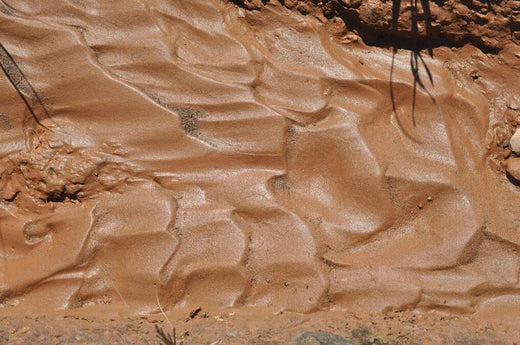Dreaming of transforming your stubborn, clay-packed backyard into a lush, green sanctuary? If you're battling with the dense, compact nature of clay soil, you've come to the right place.
At Lawn Synergy, we specialize in turning challenging landscapes into verdant paradises. In this article, we'll dive deeper into the best grass seed for clay soil, exploring varieties that thrive in these tough conditions.
So, if you're ready to learn how to select the right seed that promises growth and resilience, ensuring you achieve the garden of your dreams, continue reading. We're here to guide you every step of the way to a more vibrant lawn.
What this article covers:
- Understanding Clay Soil
- Factors to Consider When Choosing Grass Seed for Clay Soil
- Best Grass Seed Options for Clay Soil
- Preparing Clay Soil for Grass Seed
- Planting Grass Seed in Clay Soil
- Maintaining a Lawn on Clay Soil
- Common Problems with Clay Soil Lawns
Understanding Clay Soil
What Is Clay Soil?
Clay soil is defined by its fine texture, consisting of minuscule particles that compact tightly together.
This characteristic enables it to retain moisture effectively, which, while seemingly advantageous, can lead to significant issues such as waterlogging and reduced aeration.
These problems result in a challenging environment for root growth and can detrimentally affect the health and appearance of your lawn.

However, these challenges are not insurmountable. With a strategic approach that includes selecting the right grass types and implementing proper soil management techniques, we can transform a clay-rich yard into a thriving, green space.
Benefits of Choosing the Right Grass for Clay Soil
Choosing the best grass seed tailored for clay conditions is crucial for transforming your lawn from a clumpy, unmanageable area into a lush, thriving landscape.
The right type of grass enhances root penetration, which is vital in clay soil because it helps roots extend through the compact layer and access essential nutrients and water deeper underground.
Improved drainage is another critical benefit; the appropriate grass species can prevent water pooling and mitigate the common problem of waterlogging in clay-rich soils.
Additionally, selecting the best grass seed for clay soil significantly boosts the overall health and aesthetics of your lawn.
Healthy grass in well-suited conditions resists diseases and pests more effectively and maintains a vibrant green appearance, enhancing your home's curb appeal.
Factors to Consider When Choosing Grass Seed for Clay Soil
Climate and Region
The climate you live in plays a pivotal role in selecting the right grass seed. Grass varieties that thrive in cooler climates might not perform well in warmer areas, and vice versa.
Water Tolerance and Drainage
Since clay soil retains moisture, opt for grass types with high water tolerance. This ensures that your lawn stays healthy and green without becoming waterlogged.
Lawn Usage
Consider how your lawn is used—whether it's a play area for kids or a decorative part of your garden. Different grass types offer varying levels of durability and maintenance needs.
Best Grass Seed Options for Clay Soil
Tall Fescue
The best tall fescue grass seed is highly regarded for its robust root system that digs deep into the compact nature of clay soil, making it an exceptional choice for creating durable, resilient lawns.
That's why we recommend the Lesco Tall Fescue Select Blend Grass Seed. This blend is designed to deliver a turf that withstands drought, heat, shade, and heavy foot traffic, making it versatile for various environmental conditions.
The inclusion of endophytes in the Tall Fescue Select Blend enhances its resistance to above-ground feeding insects, an added advantage for maintaining lawn health without excessive pesticide use.
When planted at the recommended rates, Tall Fescue Select Blend forms a dense, fine-textured turf noted for its superior mowing qualities.
Additionally, each component of the Tall Fescue Select Blend has been rigorously tested in turf trials, focusing on selecting varieties with optimal disease resistance and other desirable traits, ensuring that your lawn is not only lush but also genetically equipped to handle potential challenges.
Perennial Ryegrass
Perennial Ryegrass is celebrated for its rapid establishment, quickly sprouting to form a dense, fine-bladed turf that excels in areas subjected to frequent use and high traffic.
This resilience makes it an ideal choice for both residential lawns and public spaces where durability and aesthetics are key.
The fast germination rate of Perennial Ryegrass ensures that it quickly covers bare spots, enhancing the lawn's appearance and reducing erosion effectively.
Additionally, its fine-bladed texture creates a smooth, lush green carpet that is visually appealing and soft to the touch.
For regions like the Bay Area, where the climate varies, this grass adapts well, making it one of the best grass seeds for the bay area if you're seeking a robust, attractive lawn solution that requires minimal downtime for establishment.
Its ability to handle wear and tear makes it a top candidate for both ornamental lawns and functional turf areas.

Kentucky Bluegrass
Kentucky Bluegrass is particularly well-suited for cooler regions, where its ability to thrive in clay soil makes it a top choice for homeowners aiming for a lush, durable lawn.
This grass variety's extensive root system penetrates deep into the soil, enhancing its ability to access nutrients and water, which is crucial in the dense, compact nature of clay.
Such a robust root structure not only supports a healthier and thicker lawn but also improves its resilience against environmental stresses such as cold and frost.
Furthermore, Kentucky Bluegrass is known for its ability to recover from damage due to its rhizomatous growth, which helps to fill in bare spots naturally and maintain a uniform appearance.
Its rich color and fine texture contribute significantly to its popularity, providing a visually appealing turf that enhances the aesthetic value of properties.
Bermuda Grass
Bermuda Grass is renowned for its exceptional performance in warmer climates, where it thrives in hard, compact soils typical of these regions.
Its resilience and ability to adapt make it an excellent choice for areas that experience intense heat and occasional drought.
This grass type forms a dense, fine-textured turf that is not only durable under physical stress such as frequent foot traffic but also maintains a deep green color that enhances curb appeal.
Bermuda Grass's aggressive growth pattern allows it to repair itself efficiently, quickly filling in bare spots and maintaining uniformity across the lawn.
Moreover, its root system is capable of penetrating deeply into compact soil, helping it to access water and nutrients more effectively, which contributes to its overall health and vigor.
This combination of durability, aesthetic appeal, and self-repairing capabilities makes Bermuda Grass a popular choice for homeowners seeking a low-maintenance yet attractive lawn solution in warmer climates.
Preparing Clay Soil for Grass Seed
Soil Testing and Amendments
Test your soil's pH and nutrient content to tailor your soil amendments accurately, improving growth conditions before planting.
Aeration and Drainage Solutions
Aerating your lawn allows more air, nutrients, and water to penetrate the soil, alleviating compaction and enhancing root growth.
Pre-Seeding Preparation
Ensure your clay soil is finely tilled and mixed with organic matter to boost nutrient levels and improve structure.
Planting Grass Seed in Clay Soil
Best Planting Seasons
The best grass seed to plant in fall provides ample time for establishment before the stress of summer heat or winter cold.
Seeding Techniques
Use a spreader for even seed distribution, and lightly rake the seeds into the soil to ensure good contact.
Watering Guidelines
Water your newly seeded lawn gently but consistently to maintain moist conditions without causing runoff.
Maintaining a Lawn on Clay Soil
Fertilization and Soil Care
Regular feeding tailored to clay soil can help maintain vigor and color, enhancing your lawn's overall health.
Mowing Practices
Mowing at the correct height based on your grass type will encourage dense growth and reduce weed competition.
Addressing Compaction Over Time
Regularly aerate your lawn to prevent compaction, ensuring a healthy air and moisture balance in the soil.

Common Problems with Clay Soil Lawns
Poor Drainage and Standing Water
Implement proper grading and consider installing drainage solutions to combat waterlogging.
Thinning Grass or Bare Spots
Overseed regularly to maintain a dense, healthy lawn, particularly in areas prone to thinning.
Conclusion
With Lawn Synergy's expert guidance on the best grass seed for clay soil, your dream of a lush, resilient lawn is within reach.
Don't let clay soil hold you back. Choose the right seed, prepare your soil properly, and maintain your lawn with care.
Ready to transform your lawn? Visit Lawn Synergy today and explore our wide range of products tailored for every lawn enthusiast.
If you want to learn more, check out these articles below:
- Best Grass Seed for Sandy Soil
- Best Grass Seed Sun and Shade
- Best Grass Seed for Rocky Soil
- Best Grass Seed for Bad Soil
- Best Grass Seed for Full Sun
- Best Grass Seed for Bay Area
- Best Grass Seed for Long Island
- Best Grass Seed for Nebraska
- Best Grass Seed for Eastern Washington
- Best Grass Seed for Slopes
- Best Grass Seed for Idaho
- Best Grass Seed for Delaware
- Best Grass Seed for Wyoming
- Best Grass Seed for South Dakota
- Best Grass Seed for Sacramento





